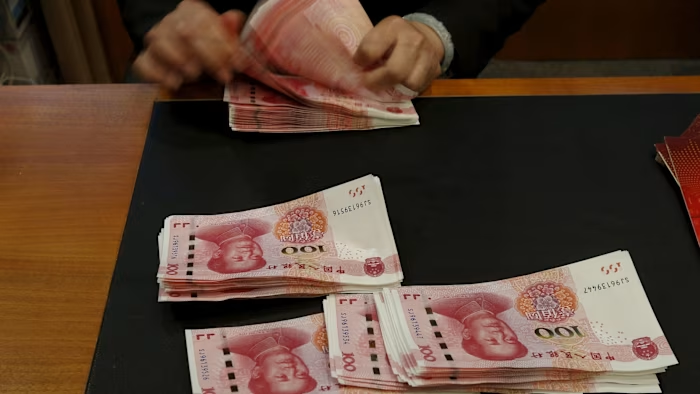Xu, Z. et al. NLRP inflammasomes in health and disease. Mol. Biomed. 5 (1), 14 (2024).
Google Scholar
Carroll, K., Sawden, M. & Sharma, S. DAMPs, PAMPs, NLRs, RIGs, CLRs and TLRs–Understanding the alphabet soup in the context of bone biology. Curr. Osteoporos. Rep. 23 (1), 6 (2025).
Google Scholar
Zheng, D., Liwinski, T. & Elinav, E. Inflammasome activation and regulation: toward a better Understanding of complex mechanisms. Cell. Discovery. 6 (1), 36 (2020).
Google Scholar
Fusco, R. et al. Focus on the role of NLRP3 inflammasome in diseases. Int. J. Mol. Sci. 21 (12), 4223 (2020).
Google Scholar
Van de Veerdonk, F. L. et al. Inflammasome activation and IL-1β and IL-18 processing during infection. Trends Immunol. 32 (3), 110–116 (2011).
Google Scholar
Dadkhah, M. & Sharifi, M. The NLRP3 inflammasome: mechanisms of activation, regulation, and role in diseases. Int. Rev. Immunol. 44 (2), 98–111 (2025).
Google Scholar
Jurcău, M. C. et al. The link between oxidative stress, mitochondrial dysfunction and neuroinflammation in the pathophysiology of alzheimer’s disease: therapeutic implications and future perspectives. Antioxidants 11 (11), 2167 (2022).
Google Scholar
Li, Y. et al. Targeting microglial α-synuclein/TLRs/NF-kappaB/NLRP3 inflammasome axis in parkinson’s disease. Front. Immunol. 12, 719807 (2021).
Google Scholar
Nasoohi, S., Parveen, K. & Ishrat, T. Metabolic syndrome, brain insulin resistance, and alzheimer’s disease: thioredoxin interacting protein (TXNIP) and inflammasome as core amplifiers. J. Alzheimer’s Disease. 66 (3), 857–885 (2018).
Google Scholar
Boršić, E. et al. Clustering of NLRP3 induced by membrane or protein scaffolds promotes inflammasome assembly. Nat. Commun. 16 (1), 4887 (2025).
Google Scholar
Fu, J. & Wu, H. Structural mechanisms of NLRP3 inflammasome assembly and activation. Annu. Rev. Immunol. 41 (1), 301–316 (2023).
Google Scholar
Zhang, X. et al. Inhibitors of the NLRP3 inflammasome pathway as promising therapeutic candidates for inflammatory diseases. Int. J. Mol. Med. 51 (4), 35 (2023).
Google Scholar
Kennedy, C. R. et al. A probe for NLRP3 inflammasome inhibitor MCC950 identifies carbonic anhydrase 2 as a novel target. ACS Chem. Biol. 16 (6), 982–990 (2021).
Google Scholar
Patel, V. & Shah, M. Artificial intelligence and machine learning in drug discovery and development. Intell. Med. 2 (3), 134–140 (2022).
Google Scholar
Daroch, A. & Purohit, R. MDbDMRP: A novel molecular descriptor-based computational model to identify drug-miRNA relationships. Int. J. Biol. Macromol. 287, 138580 (2025).
Google Scholar
Sharma, B. & Purohit, R. Enhanced sampling simulations to explore Himalayan phytochemicals as potential phosphodiesterase-1 inhibitor for neurological disorders. Biochem. Biophys. Res. Commun. 758, 151614 (2025).
Google Scholar
Singh, R. & Purohit, R. Determining the effect of natural compounds on mutations of Pyrazinamidase in multidrug-resistant tuberculosis: illuminating the dark tunnel. Biochem. Biophys. Res. Commun. 756, 151575 (2025).
Google Scholar
Gupta, A., Thind, A. S. & Purohit, R. EGFR AP: a predictive machine learning model for assessing small molecule activity against the epidermal growth factor receptor. RSC Med. Chem. 16 (9), 4415–4426 (2025).
Google Scholar
Hayat, C. et al. Identification of new potent NLRP3 inhibitors by multi-level in-silico approaches. BMC Chem. 18 (1), 76 (2024).
Google Scholar
Pinheiro, G. A. et al. Machine learning prediction of nine molecular properties based on the SMILES representation of the QM9 quantum-chemistry dataset. J. Phys. Chem. A. 124 (47), 9854–9866 (2020).
Google Scholar
Kaneko, H. Molecular descriptors, structure generation, and inverse QSAR/QSPR based on SELFIES. ACS Omega. 8 (24), 21781–21786 (2023).
Google Scholar
Samkhaniani, M. et al. A machine learning approach to feature selection and uncertainty analysis for biogas production in wastewater treatment plants. Waste Manage. 197, 14–24 (2025).
Google Scholar
Pantic, I. & Paunovic Pantic, J. Artificial intelligence in chromatin analysis: A random forest model enhanced by fractal and wavelet features. Fractal Fract. 8 (8), 490 (2024).
Google Scholar
Ishfaq, M. et al. Multinomial classification of NLRP3 inhibitory compounds based on large scale machine learning approaches. Mol. Diversity. 28 (4), 1849–1868 (2024).
Google Scholar
Mehrabinezhad, A., Teshnehlab, M. & Sharifi, A. A comparative study to examine principal component analysis and kernel principal component analysis-based weighting layer for convolutional neural networks. Comput. Methods Biomech. Biomedical Engineering: Imaging Visualization. 12 (1), 2379526 (2024).
Google Scholar
Abdul-Al, M. et al. A novel approach to enhancing multi-modal facial recognition: integrating convolutional neural networks, principal component analysis, and sequential neural networks. IEEE Access. 12 (2024).
Haji, A. Comparative analysis of autoencoder and PCA for dimensionality reduction in gene expression data. (2024).
Kaib, M. T. H. et al. Data size reduction approach for nonlinear process monitoring refinement using kernel PCA technique. Expert Syst. Appl. 274, 126975 (2025).
Google Scholar
Makkulau, M. et al. Variance The Estimation Eigen Value of Principal Component Analysis and Nonlinear Principal Component Analysis. in ITM Web of Conferences. EDP Sciences. (2024).
Frost, H. R. Eigenvectors from eigenvalues sparse principal component analysis (EESPCA). J. Comput. Graphical Statistics: Joint Publication Am. Stat. Association Inst. Math. Stat. Interface Foundation North. Am. 31 (2), 486 (2021).
Google Scholar
Eze, N. M., Asogwa, O. C. & Eze, C. M. Principal component factor analysis of some development factors in Southern Nigeria and its extension to regression analysis. J. Adv. Math. Comput. Sci. 36 (3), 132–160 (2021).
Google Scholar
Abdulhafedh, A. Incorporating k-means, hierarchical clustering and Pca in customer segmentation. J. City Dev. 3 (1), 12–30 (2021).
Google Scholar
Niazi, S. K. & Mariam, Z. Recent advances in machine-learning-based chemoinformatics: a comprehensive review. Int. J. Mol. Sci. 24 (14), 11488 (2023).
Google Scholar
Wani, M. A. & Roy, K. K. Development and validation of consensus machine learning-based models for the prediction of novel small molecules as potential anti-tubercular agents. Mol. Diversity. 26 (3), 1345–1356 (2022).
Google Scholar
Shrivastava, T., Singh, V. & Agrawal, A. Autism spectrum disorder detection with kNN imputer and machine learning classifiers via questionnaire mode of screening. Health Inform. Sci. Syst. 12 (1), 18 (2024).
Google Scholar
Almatroudi, A. Integrative machine learning, virtual screening, and molecular modeling for BacA-Targeted Anti-Biofilm drug discovery against Staphylococcal infections. Crystals 14 (12), 1057 (2024).
Google Scholar
Zhang, H. et al. Machine learning methods for weather forecasting: A survey. Atmosphere 16 (1), 82 (2025).
Google Scholar
Salama, M. Optimization of regression models using machine learning: A comprehensive study with scikit-learn. Optimization of Regression Models Using Machine Learning: A Comprehensive Study with Scikit-learn| IUSRJ, 5. (2024).
Alemerien, K., Alsarayreh, S. & Altarawneh, E. Diagnosing cardiovascular diseases using optimized machine learning algorithms with GridSearchCV. J. Appl. Data Sci. 5 (4), 1539–1552 (2024).
Google Scholar
Padhy, S. & SMOTE-based Deep, L. S. T. M. System with GridSearchCV optimization for intelligent diabetes diagnosis. J. Electr. Syst. 20 (7s), 804–815 (2024).
Google Scholar
Mumtaz, A. et al. MPD3: a useful medicinal plants database for drug designing. Nat. Prod. Res. 31 (11), 1228–1236 (2017).
Google Scholar
Aloufi, B. H., Snoussi, M. & Sulieman, A. M. E. Antiviral efficacy of selected natural phytochemicals against SARS-CoV-2 Spike glycoprotein using structure-based drug designing. Molecules 27 (8), 2401 (2022).
Google Scholar
El-Hachem, N. et al. AutoDock and AutoDockTools for protein-ligand docking: beta-site amyloid precursor protein cleaving enzyme 1 (BACE1) as a case study, in Neuroproteomics: Methods and Protocols. Springer.391–403. (2017).
Zayed, A. O. H. Optimizing protein-ligand Docking through machine learning: algorithm selection with AutoDock Vina. Discover Chem. 2 (1), 164 (2025).
Google Scholar
Kaur, J., Kaur, S. & andSingh Rational modification of the lead molecule: enhancement in the anticancer and dihydrofolate reductase inhibitory activity. Bioorg. Med. Chem. Lett. 26 (8), 1936–1940 (2016).
Google Scholar
Berendsen, H. J., van der Spoel, D. & van Drunen, R. A message-passing parallel molecular dynamics implementation. Comput. Phys. Commun. 91 (1–3), 43–56 (1995).
Google Scholar
Huang, J. & MacKerell, A. D. Jr CHARMM36 all-atom additive protein force field: validation based on comparison to NMR data. J. Comput. Chem. 34 (25), 2135–2145 (2013).
Google Scholar
Mishra, S. et al. Classical molecular dynamics simulation identifies catechingallate as a promising antiviral polyphenol against MPOX palmitoylated surface protein. Comput. Biol. Chem. 110, 108070 (2024).
Google Scholar
Ramsey, I. S. et al. An aqueous H + permeation pathway in the voltage-gated proton channel Hv1. Nat. Struct. Mol. Biol. 17 (7), 869–875 (2010).
Google Scholar
Kognole, A. A. et al. CHARMM-GUI Drude Prepper for molecular dynamics simulation using the classical Drude polarizable force field. J. Comput. Chem. 43 (5), 359–375 (2022).
Google Scholar
Jawad, B. et al. Key interacting residues between RBD of SARS-CoV-2 and ACE2 receptor: combination of molecular dynamics simulation and density functional calculation. J. Chem. Inf. Model. 61 (9), 4425–4441 (2021).
Google Scholar
Gilson, M. K. & Zhou, H. X. Calculation of protein-ligand binding affinities. Annu. Rev. Biophys. Biomol. Struct. 36 (1), 21–42 (2007).
Google Scholar
Du, X. et al. Insights into protein–ligand interactions: mechanisms, models, and methods. Int. J. Mol. Sci. 17 (2), 144 (2016).
Google Scholar
Yasir, M. et al. Investigating the inhibitory potential of flavonoids against aldose reductase: insights from molecular docking, dynamics simulations, and gmx_MMPBSA analysis. Curr. Issues. Mol. Biol. 46 (10), 11503–11518 (2024).
Google Scholar
Kadhum, L. H. Geometry optimization of coupling allin-metformin using dft/b3lyp molecular modelling technique: geometry optimization of coupling allin-metformin using dft/b3lyp molecular modelling technique. Iraqi J. Market Res. Consumer Prot. 13 (2), 89–100 (2021).
Google Scholar
El Addali, A. et al. Theoretical study of the phosphate units stability by the Dft b3lyp/6-311 g quantum method. J. Chem. Technol. 31 (3), 477–485 (2023).
Google Scholar
Mackay, A. et al. Discovery of NP3-253, a potent brain penetrant inhibitor of the NLRP3 inflammasome. J. Med. Chem. 67 (23), 20780–20798 (2024).
Google Scholar
Bağlan, M., Gören, K. & Yıldıko, Ü. MEP analysis and molecular Docking using DFT calculations in DFPA molecule. Int. J. Chem. Technol. 7 (1), 38–47 (2023).
Google Scholar
Taher, S. R. & Hamad, W. M. Synthesis, characterization, density functional theory (DFT) analysis, and mesomorphic study of new thiazole derivatives. Bull. Chem. Soc. Ethiop. 38 (6), 1827–1842 (2024).
Google Scholar
Stuart, J. G. & Jebaraj, J. W. Synthesis, characterisation, in Silico molecular Docking and DFT studies of 2, 6-bis (4-hydroxy-3-methoxyphenyl)-3, 5-dimethylpiperidin-4-one. Indian J. Chem. (IJC). 62 (10), 1061–1080 (2023).
Google Scholar
Andonova, V. et al. Spectral characteristics, in Silico perspectives, density functional theory (DFT), and therapeutic potential of green-extracted phycocyanin from spirulina. Int. J. Mol. Sci. 25 (17), 9170 (2024).
Google Scholar
Wu, S. et al. Theoretical study on the adsorption of Sulforaphane on B 12 N 12-related nanocages based on density functional theory. New J. Chem. 47 (47), 21743–21752 (2023).
Google Scholar
Khalid, M. et al. Exploration of noncovalent interactions, chemical reactivity, and nonlinear optical properties of Piperidone derivatives: a concise theoretical approach. ACS Omega. 5 (22), 13236–13249 (2020).
Google Scholar
Solgun, D. G. et al. Synthesis of axially silicon phthalocyanine substituted with bis-(3, 4-dimethoxyphenethoxy) groups, DFT and molecular Docking studies. J. Incl. Phenom. Macrocyclic Chem. 102 (11), 851–860 (2022).
Google Scholar
Ganiev, B., Mardonov, U. & Kholikova, G. Molecular structure, HOMO-LUMO, MEP-–Analysis of triazine compounds using DFT (B3LYP) calculations. Materials Today: Proceedings, (2023).
Pardridge, W. M. Drug transport across the blood–brain barrier. J. Cereb. Blood flow. Metabolism. 32 (11), 1959–1972 (2012).
Google Scholar
Leeson, P. D. & Springthorpe, B. The influence of drug-like concepts on decision-making in medicinal chemistry. Nat. Rev. Drug Discovery. 6 (11), 881–890 (2007).
Google Scholar





